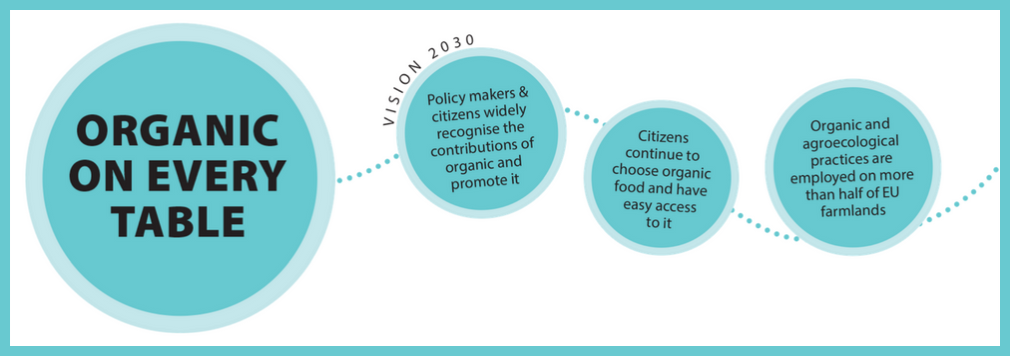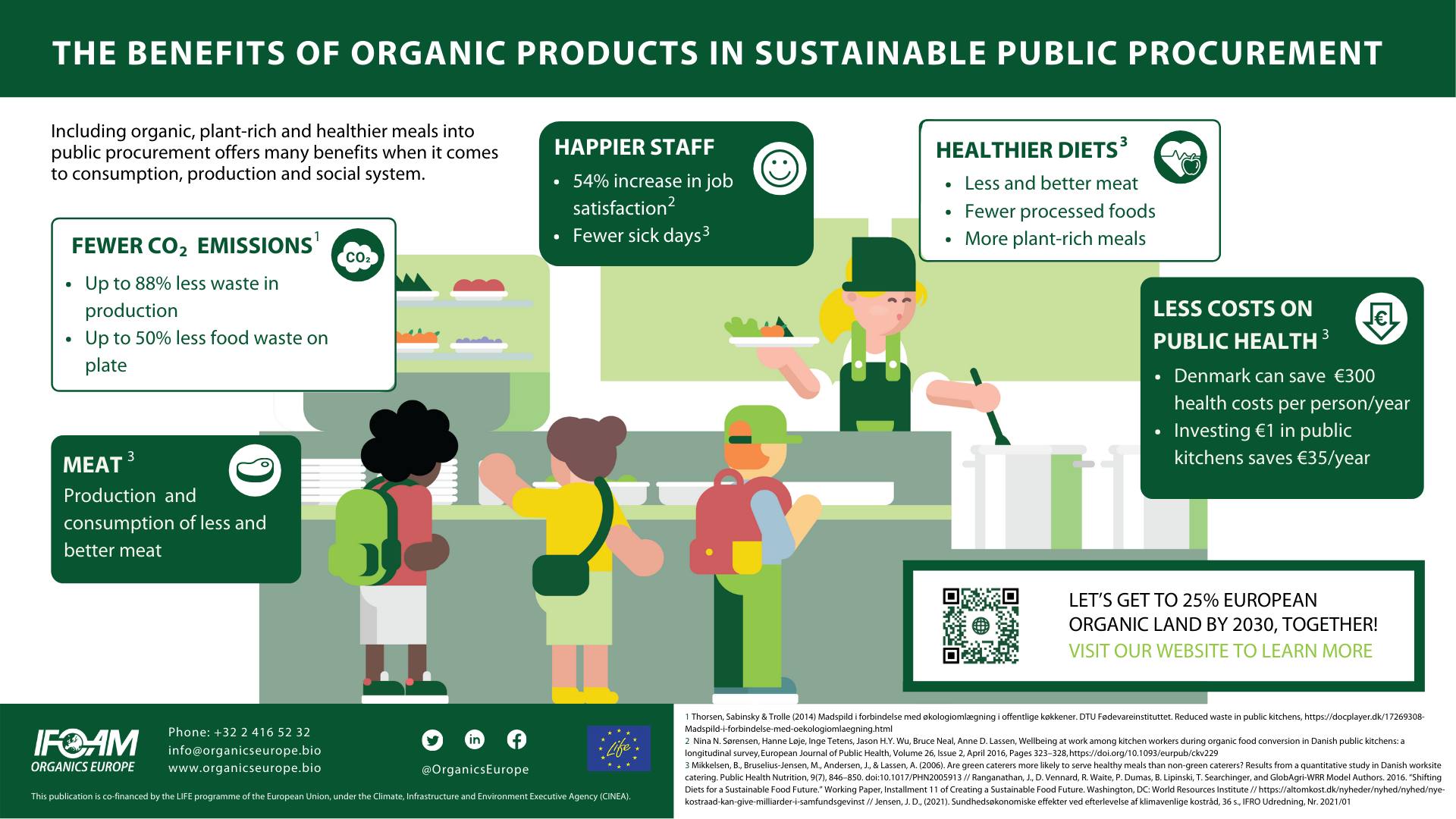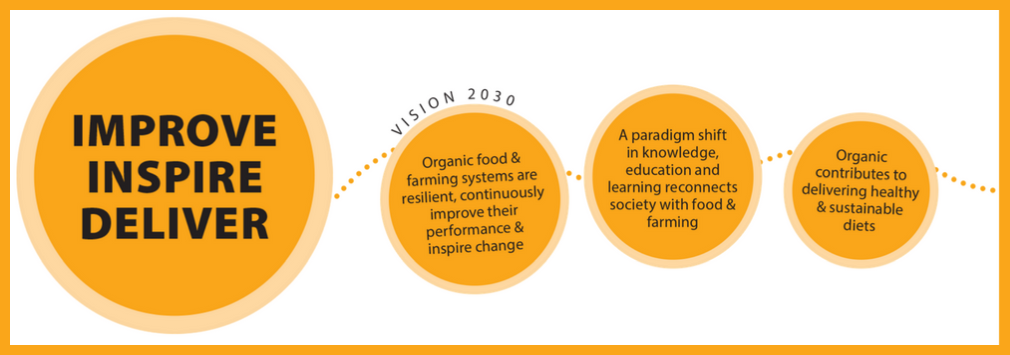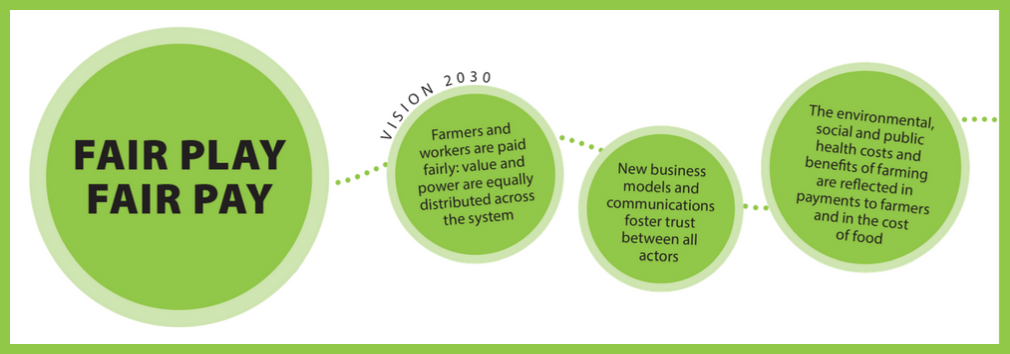Our achievements 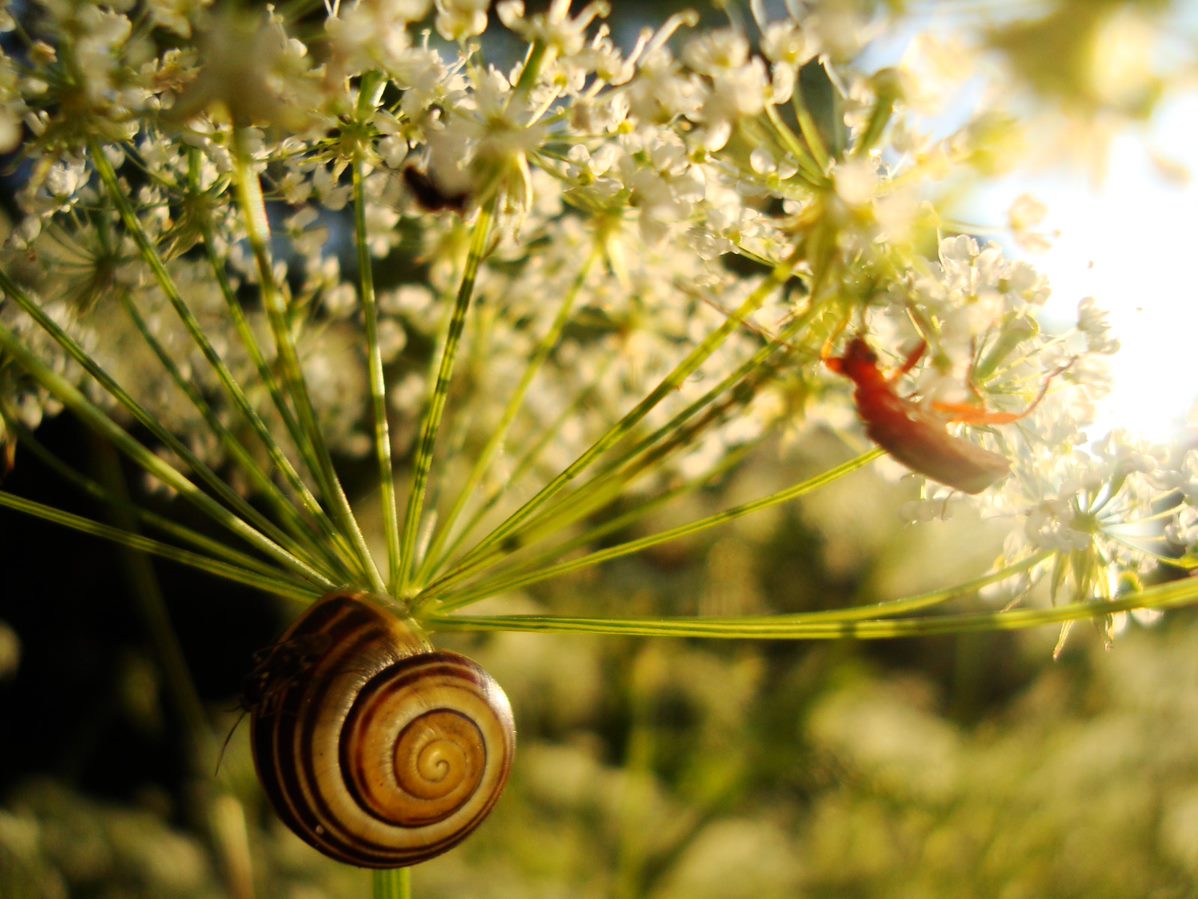
Organic on every table
For us, Organic on every table means high-quality and healthy food becoming more widely available. This can only be achieved by increasing production and raising awareness among consumers and policymakers of organic’s economic, environmental, and social benefits.
To make organic on every table a reality, we advocated policymakers to put in place incentives and coherent policies supporting farmers providing public goods. We did this together with a vast network of food and farming actors, civil society, companies, and non-governmental organisations (NGOs).
Setting an ambitious EU agenda for organic
Ensuring the Farm to Fork and Biodiversity strategies are reflected in EU policies
With the Farm to Fork and Biodiversity strategies’ publication on 20 May 2020, the European Commission put organic at the heart of the transformation of Europe’s food and farming sector. It recognizes that food systems are responsible for approximately 29% of the world’s greenhouse gas (GHG) emissions and nearly 70% of all agricultural GHG emissions come from the animal sector. Furthermore, it explicitly states that “there is an urgent need to reduce dependency on pesticides and antimicrobials, reduce the use of fertilisers, increase organic farming, improve animal welfare, and reverse biodiversity loss”. The Farm to Fork (F2F) Strategy intends to lead a global transition towards competitive sustainability from farm to fork. We collaborated with other NGOs and civil society organisations, to ensure the EU stands by the Farm to Fork (F2F) strategy and its targets of 25% organic land and 50% reduction in pesticides and antibiotics by 2030, as well as measures to boost the demand for organic products through promotion schemes and green public procurement. For instance, IFOAM Organics Europe and its members advocated towards the European Commission and the Member States to ensure a target for organic farmland by 2027 and/or 2030 was set in each national Common Agricultural Policy (CAP) Strategic Plan. To achieve so, we sent one report (June 2021) to the European Commission and published another one (November 2021) to assess the level of ambition and support of organic in the CAP Strategic Plans. We also met with officials of the European Commission’s Directorate-Generals for Agriculture and Rural Development (DG AGRI) and for Environment (DG ENV) to raise our demands.
We were also happy to see the Commission’s commitment to publish a new Organic Action Plan – one taking up most of the European organic movement’s demands.
A testament to the importance of the Farm to Fork Strategy is the European Parliament’s own-initiative report. Thanks to IFOAM Organics Europe’s advocacy efforts together with like-minded organisations, it supports the principles, mechanisms and rules promoting the environment and human health and recognises the contribution of organic farming to transitioning towards more sustainable food systems.
Securing a balanced EU approach in the EU Organic Action Plan
On March 25, 2021, the European Commission published the EU Organic Action Plan for 2021-2030. We welcomed the Commission’s new Organic Action Plan (OAP) 2021-2027 and particularly its “push-pull” approach, aiming at balancing increases in both production and demand of organic products. It will be an important instrument for reaching the Farm to Fork strategy’s target of 25% organic land by 2030.
To reach this objective, the European Commission wants to boost the consumption of organic food in the EU and stimulate conversion to organic farming. The Action Plan also aims to increase the contribution of organic farming to the sustainability of the European agriculture sector.
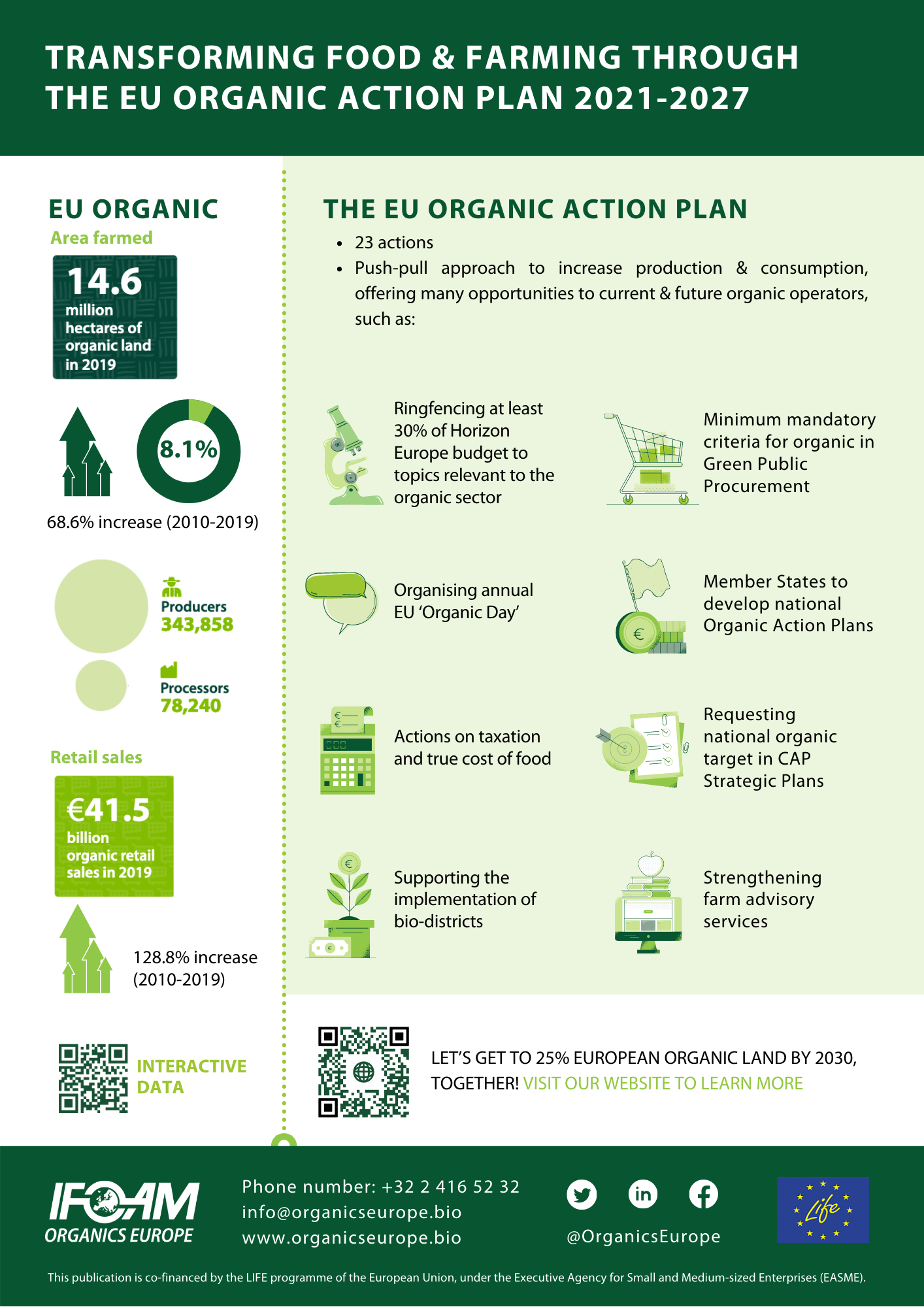
To reach this objective, the European Commission wants to boost the consumption of organic food in the EU and stimulate conversion to organic farming. The Action Plan also aims to increase the contribution of organic farming to the sustainability of the European agriculture sector. The success of the Action Plan will depend on implementation at the Member State level and how the Member States encourage increased production and promotion of organic products as well as consumer willingness to buy organic.
We were delighted to see that the new OAP took up most of the points we had advocated for as a European organic movement.
We particularly welcomed the:
- Minimum mandatory criteria for organic in public procurement,
- Ringfencing of at least 30% of Horizon Europe budget to topics relevant to organic,
- Actions on taxation and the real cost of food.
On the day of the release, IFOAM Organics Europe published an infographic on the organic action plan, highlighting the plan’s most welcomed actions.
Gearing up for a new step in the fight to keep Europe GMO-free
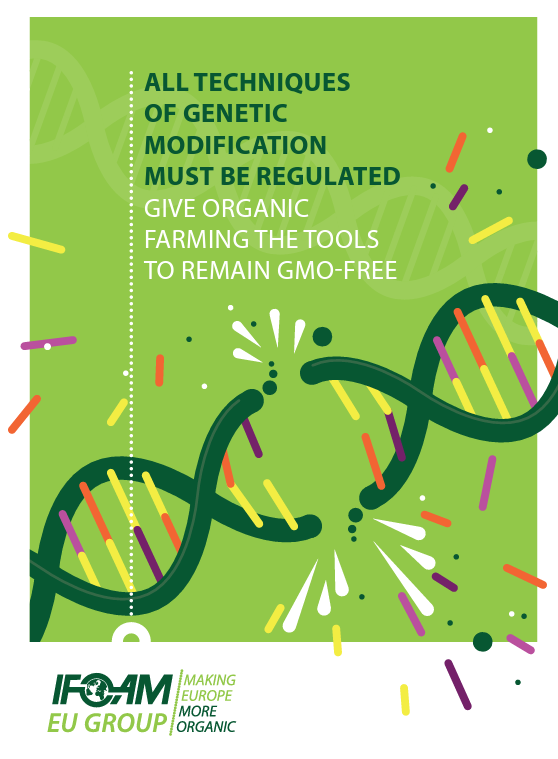
On 16 November, IFOAM Organics Europe and French Member of the European Parliament (MEP) Eric Andrieu (S&D) co-hosted a webinar on the organic approach to plant health and its potential contribution to achieving the Farm to Fork target of reducing pesticide use and risks by 50% by 2030.
The webinar explored organic’s approach to plant health and its potential contribution to achieving the Farm to Fork target of reducing pesticide use and risks by 50% by 2030. As the Commission is finalising its proposal on the revision of the Sustainable Use of pesticides Directive (SUD), it was timely to discuss the challenges and policy options to enable pesticide reduction strategies based on effective and ready-to-use alternative approaches, such as organic farming. The webinar had important guests such as Pilar Aguar Fernandez, Director for Health and Food Audits and Analysis, DG SANTE; Frank Volk, Biofa GmbH; Eric Andrieu, MEP (S&D); Paul Fouassier, Organic wine grower (FNAB) and Jutta Kienzle, Independent scientist specialised in pest control in organic fruit farming.
We also published the leaflet Plant health care in organic farming – The role of natural substances in a biodiversity-based system approach. This leaflet is key to understanding the complementarity between the targets of the Farm to Fork and Biodiversity strategies, which aim to increase organic land by 25% while reducing the use of chemical pesticides by 50% by 2030. Organic farming’s unique approach to plant protection has rightly been identified as essential to moving toward a food system that is less dependent on external toxic inputs. The organic sector is ready to deliver, and the leaflet provides concrete policy recommendations to make this ambition a reality.
Our Policy Coordinator on GMOs, Patent and Seeds, Martin Sommer, participated in the the new podcast series Slow Food Europe. The podcast is dedicated to European food and farming policies, and it gathers experts to discuss hot topics in Brussels and give insights into the European negotiations.
Reducing pesticide use in Europe
Explaining organic’s approach to plant health
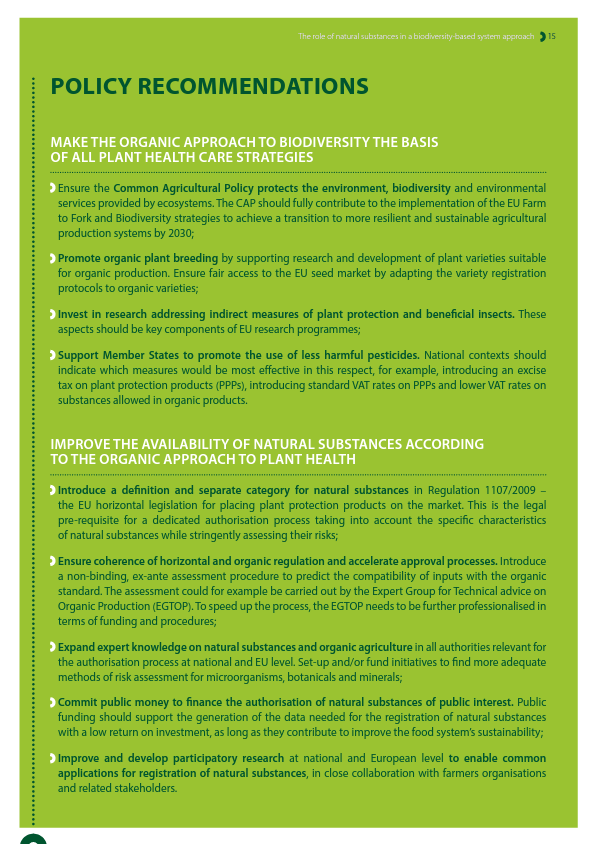
On 16 November, IFOAM Organics Europe and French Member of the European Parliament (MEP) Eric Andrieu (S&D) co-hosted a webinar on the organic approach to plant health and its potential contribution to achieving the Farm to Fork target of reducing pesticide use and risks by 50% by 2030.
The webinar explored organic’s approach to plant health and its potential contribution to achieving the Farm to Fork target of reducing pesticide use and risks by 50% by 2030. As the Commission is finalising its proposal on the revision of the Sustainable Use of pesticides Directive (SUD), it was timely to discuss the challenges and policy options to enable pesticide reduction strategies based on effective and ready-to-use alternative approaches, such as organic farming. The webinar had important guests such as Pilar Aguar Fernandez, Director for Health and Food Audits and Analysis, DG SANTE; Frank Volk, Biofa GmbH; Eric Andrieu, MEP (S&D); Paul Fouassier, Organic wine grower (FNAB) and Jutta Kienzle, Independent scientist specialised in pest control in organic fruit farming.
We also published the leaflet Plant health care in organic farming – The role of natural substances in a biodiversity-based system approach. This leaflet is key to understanding the complementarity between the targets of the Farm to Fork and Biodiversity strategies, which aim to increase organic land by 25% while reducing the use of chemical pesticides by 50% by 2030. Organic farming’s unique approach to plant protection has rightly been identified as essential to moving toward a food system that is less dependent on external toxic inputs. The organic sector is ready to deliver, and the leaflet provides concrete policy recommendations to make this ambition a reality.
Ensuring legislation recognises organic’s environmental benefits
While the European Commission is revising the Directive for sustainable use of pesticides (the so-called SUD), IFOAM Organics Europe is fully involved to promote organic agriculture as the most efficient option to reduce pesticide use.
Our contribution to the public consultation on the revision of the SUD calls for prioritising organic agriculture in the Member States’ National Action Plans implemented under the directive. This will contribute to achieving the Farm to Fork strategy’s targets on pesticide reduction. As an organic movement, we want these targets to be enshrined in the SUD so that they become legally binding. We also call on the Commission to develop a coherent set of indicators to measure pesticide reduction considering the specificities of organic agriculture. As the current SUD suffers from a lack of implementation by the Member States, its revision should be an opportunity to consider new provisions to ensure its application on the ground. Mathilde Calmels, our Policy Coordinator on Pesticides, Natural Inputs and Fertilisers participated as a speaker at the 3rd Commission stakeholder event on the revision of the SUD. We also continue our collaboration with IBMA (International Biocontrol Manufacturers’ Association) to make sure that biopesticides already on the market remain available for organic farmers.
Ensuring demand for organic through sustainable public procurement
We produced several important documents and advocacy materials on public procurement, both in our name and alongside other members of the Food Policy Coalition (FPC). All these deliverables advocate for a more sustainable public procurement, demonstrating its beneficial effects and outcomes. Examples are the seven key policy recommendations on public procurement, that were finalised in December 2021, or the FPC’s paper Sustainable public procurement: A Goal Within Reach in May 2021. We produced an article on public procurement for the IFOAM Organics Europe newsletter and a leaflet about how to include organic products in sustainable public procurement. This adds to the IFOAM Organics Europe’s infographic on the benefits of sustainable public procurement.
As a member of the Food Policy Coalition and co-lead of the Sustainable Public Procurement Taskforce, we identified synergies and, together, were more effective in our advocacy work – especially agreeing on joint mandatory criteria for public procurement.
During the European Organic Congress 2021, we organised a session “Towards more sustainable food systems” also addressing sustainable public procurement with high-level speakers such as Director Nathalie Chaze from the Directorate-General for Health and Food Safety (DG SANTE).
Preparing organic actors for the implementation of the new EU Organic Regulation
Organic production, labelling and controls have been regulated at the EU level since 1991. Up to 31 December 2021, the EU requirements for organic production were set by Regulation (EC) No 834/2007 defining the aims, objectives, and principles of organics. Two implementing regulations (No 889/2008 and No 1235/2008) detailed organic production, labelling, control and import rules. All products labelled as organic and sold in the EU were produced under these regulations.
This set of rules was recently replaced. After a long revision process, the new organic regulation (EU) 2018/848 was published in June 2018. It applies from 1 January 2022. Originally, this new regulation was to apply as of 1 January 2021. However, due to the COVID-19 pandemic, organic producers and the organic control system were under stress, making a smooth transition from the current legal framework to the new one extremely challenging. Despite the difficult task to amend a regulation that was already published in the EU’s official Journal, the work we did with our members paid off and implementation of the new EU Organic Regulation was postponed to 1 January 2022.
The legislative framework is often complicated and excessively hard to understand. To help smoothen this transition, we developed guidelines to help interpret EU Organic Regulation helping our members and operators navigate the new regulations. Simplification and some assistance can really make organic operators’ lives much simpler.
Boosting the availability of organic seeds: LIVESEED project and patents on classic breeds
The LIVESEED project increased transparency and provided recommendations on organic seeds and plant breeding. Project partners put their hearts and souls into boosting organic seed and plant breeding, analysing national seed databases and factors influencing organic seed production and use. They also explored national policies, smart practices, build EU infrastructure and analysed issues on propagation.
The partners also advanced testing protocols to improve the availability of organic seeds, ensuring they are adapted to the realities of organic farmers. Essential outcomes of the project were the systems-based breeding concept, which combines participatory approaches with modern breeding tools considering different socio-economic contexts and the EU router database for organic seeds, which facilitates information exchange on seeds at the EU level.
The LIVESEED project came to an end on 30 September 2021, after 52 months of activities. During this time, several resources, tools, practice abstracts, booklets (many of which were translated into several EU languages), videos, research reports, and presentations were produced and made available through the project website. All these materials are a useful source of information for all those active in organic seed and plant breeding.
Among the documents we would like to highlight:
- The booklet with project outcomes and results LIVESEED – Boosting organic seed and plant breeding across Europe;
- Boosting organic seed and breeding across Europe: recommendations for stakeholders and policymakers (booklet);
- Recommendations per topic and target group (posters);
- A national roadmap towards 100% organic seed by 2036 (policy brief);
Policy and stakeholder recommendations to boost the organic seed & breeding sector (report).
Improve – Inspire – Deliver
‘Improve – Inspire – Deliver’ is the second pillar of our roadmap. The entire organic supply chain has always been a driver of innovation – showing the organic movement’s potential to drive change in harmony with ecosystems and those inhabiting them.
Inspiring about organic’s benefits to pollinators
Our Policy Coordinator on Pesticides, Natural Inputs and Fertilisers participated as speaker at the EU Pollinators Week on 28 September, for the session “EU actions for pollinators in agricultural landscapes” of the European Committee of the Regions. The session aimed to share views about how the EU policy, and the future Common Agricultural Policy, should be shaped to protect and promote pollinator conservation in agricultural land. They also wrote a contribution to the stakeholder consultation on the new EU pollinators initiative, organised by the Committee of the Regions, and spoke at the 6th European Copper Conference, presenting the European strategy for copper minimisation in organic farming.
Moreover, we participated (and continue to participate) in various expert groups: the EFSA Stakeholder Forum, the EFSA Roundtable with NGOs, the Commission Expert Group on Fertilising Products, the Plenary meeting of the advisory group on the food chain and animal and plant health. We were also actively engaged in the NGO Pesticide group, which mainly focused on the revision of SUD.
Ensuring better data-collection on organic farming
IFOAM Organics Europe welcomes the Commission’s initiative to review the Farm Accountancy Data Network (FADN) Regulation to transform it into a Farm Sustainability Data Network (FSDN). Economic data collected at farm level should be completed with data on the environmental and social components of farms, for policy monitoring and evaluation and research. Such a holistic approach will:
- Help understand the economic, social, and environmental impacts of agricultural practices, and
- Identify which of these practices should be supported to achieve the targets set by the Farm to Fork and Biodiversity strategies.
This should ultimately contribute to a wide uptake of sustainable practices.
We also advocated on the Commission’s proposal for a Regulation on Statistics on Agricultural Inputs and Outputs (SAIO), calling for better data on the use of natural inputs in organic farming. This should improve the knowledge base of the sector. We were also providing input to the co-decision process.
Ensuring funds for organic research
Advocating for organic through TP Organics
TP Organics is one of the 40 European Technology Platforms (ETPs), officially recognised by the European Commission. As an ETP, TP Organics is the European Technology Platform for Organic Food and Farming. It develops research & innovation agendas and roadmaps for research action at the EU and national levels. R&I is crucial for developing the organic sector and designing more sustainable food systems. That is why it advocates for more research funding benefiting organic and agroecological approaches.
With the Farm to Fork Strategy’s target of 25% farmland share in Europe by 2030, organic is now highly visible in the policy debate. This needs to be reflected in a bigger share of the EU budget, including Horizon Europe, to stimulate the conversion of farmers. TP Organics functions as an innovation broker and the main advocacy organisation of the organic movement for EU Research and Innovation policy. As IFOAM Organics Europe, we continued hosting and take a leading role in TP Organics in 2021.
Three calls for organic and 20 calls related to organic in EU research & innovation funding
TP Organics has advised the European Commission on the priorities for the Seventh framework programme of the European Community for research and technological development including demonstration activities (FP7) and the EU’s R&I framework programmes Horizon 2020 and Horizon Europe. Our advocacy efforts through TP Organics proved to be successful:
- Between 2016-2020, the amount of funding for organic-only calls in Horizon 2020 reached EUR 38 million, compared to EUR 1.5 million (0.44%) under FP7 (Societal Challenge 2 – Food Security, Sustainable Agriculture and Forestry, Marine, Maritime and Inland Water Research and the Bioeconomy + CORE Organic);
- The respective number of calls where ‘organic’ is mentioned increased from 6 in FP7 (WP2013) to 47 in Horizon 2020 (8 in Horizon 2020’s work package 2014-2015, 21 Horizon 2020’s work package 2016-2017 and 18 in Horizon 2020’s work package 2018-2020.
The new EU Organic Action Plan foresees allocating at least 30% of the budget for Research and Innovation actions in the field of agriculture, forestry and rural areas to topics specific to or relevant to the organic sector. Cluster 6 of Horizon Europe has a total budget of EUR 8,952 million. The intervention area “Agriculture, forestry and rural areas” is one of 7 intervention areas in this cluster. Assuming each intervention area receives an equal share of the cluster budget, and organic receives 30% of intervention area 3, there is potentially EUR 380 million of R&I funding available for topics that are relevant for organic in Horizon Europe. The first Work Programme (2021-2022) includes three organic-specific calls as well as 20 calls where ‘organic’ is mentioned.
Moreover, TP Organics continues collaborating with the new EU R&I Partnerships on Agroecology and Sustainable Food Systems that are part of Horizon Europe (as part of the SCAR Strategic Working Group on Agroecology and the dedicated task forces on definitions, research needs and collaboration with other actors). The Agroecology Partnership will be a key instrument to support the upscaling of organic farming and agroecology. The Sustainable Food Systems Partnership, while focusing more on the post-farmgate side, will be a key tool for the transition to sustainable food systems. TP Organics is part of the core group that has developed the template (partnership proposal). For both partnerships, TP Organics is actively involved in the co-creation process of a Strategic Research and Innovation Agenda (SRIA) outlining the topics that will be translated into calls.
Concluding and winning research projects for organic
Finding alternatives to contentious input in organic
‘Replacement of Contentious Inputs in Organic Farming Systems’ (RELACS) was a Horizon 2020 project promoting the development and adoption of environmentally safe and economically viable tools and technologies to reduce the use of inputs considered contentious in organic farming systems, namely: copper and mineral oil for plant protection, recycled fertilizers and conventional manure in plant production, antibiotics and anti-worm drugs (anthelmintics) in animal production, and finally synthetic vitamins in animal production.
As IFOAM Organics Europe, we were responsible for the communication and dissemination of project results as well as the coordination of the science-practice-policy dialogue. We coordinated national workshops organised by the partners and organised a European workshop, presenting the alternatives to contentious inputs developed by RELACS and brainstormed on better adapting EU rules to ease adoption of alternative inputs.
The project release:
- Videos on new plant protection products replacing copper in organic viniculture and rose growing;
- Scientific papers on promising plant and animal protection methods and strategies for reducing the use of contentious inputs; and
- Practical guidelines, policy documents and much more.
RELACS got its spotlight at the Organic World Congress 2021, with the session “Which natural inputs do we need in organic farming systems? Discussing the future of plant protection products and fertilisers”. The project had its closing event at the Organic Innovation Days 2021, where we presented its results, European roadmaps for reducing of controversial inputs, and we reported on national workshops with farmers, advisors and scientists discussing the developed alternatives.
Inspiring organic pig & poultry farmers to use 100% organic & regional feed
OK-Net EcoFeed was a Horizon 2020 project helping organic pig and poultry farmers to achieve the goal of 100% use of organic and regional feed. The three-year project created a European network of innovation groups to facilitate the exchange and co-creation of knowledge among farmers, business actors, researchers, and advisors. It collected end-user material and developed new tools adapted to the needs of farmers and business actors.
OK-Net Ecofeed supported on-farm feed autonomy and helped producers achieve 100% organic rations for monogastric animals. Some of the main outcomes included:
- The use of sprouted seeds as valuable green fodder for animal welfare;
- The use of camelina cake as a protein-rich feed, and an efficient alternative to the protein of soy and brewer’s yeast, an industry by-product rich in protein and vitamin b to be used as an alternative source of protein.
New research projects
We successfully applied for new research projects. OrganicTargets4EU will support the achievement of the Farm to Fork Strategy’s targets of reaching 25% of EU agricultural land under organic production and significantly increasing organic aquaculture by 2030. We will coordinate this project starting in September 2022.
In addition, we successfully applied three other projects: Climate Farm Demo, FarmBook 3.0, LIVESEEDing.
First prize in the Organic Farm Knowledge
The online platform Organic Farm Knowledge was awarded the first prize in the Digital Excellence in Agriculture in Europe and Central Asia – Regional Contest in the category ‘Capacity development and empowerment’.
The contest, organised by the Food and Agriculture Organization of the United Nations (FAO) Office for Europe and Central Asia and the International Telecommunication Union (ITU) Offices for Europe and the Commonwealth of Independent States with almost 200 applicants from 38 countries, identified Organic Farm Knowledge as one of 28 impactful, sustainable, scalable and innovative practices using a combination of multiple technologies, enabling the digital transition of Europe and Central Asia’s agricultural sectors.
Demonstrating organic’s innovative potential
Organic Innovation Days
On 30 November and 1 December, the Organic Innovation Days 2021 entitled “Better inputs for organic agriculture” took place online. This public event was organised by TP Organics in collaboration with the two Horizon 2020 funded EU projects RELACS and Organic-PLUS. Both projects aim to reduce the use of contentious inputs in organic farming. Intense discussions, exchanging views on the various alternatives to contentious inputs in organic farming and strategies to minimise their use, as well as the socio-economic aspects involved, were the main themes.
Participating in research projects
To show how organic food and farming can provide solutions to the challenges our food and farming systems face, IFOAM Organics Europe’s Director, Eduardo Cuoco, participated in a high-level event in the European Parliament organised by the SmartAgriHubs projects. The event highlighted the achievements and contributions of the project to EU agriculture, while also looking at the wider world and the future of new agricultural techniques.
We also continued working on the Organic Farm Knowledge platform with other organic organisations in Europe. The Organic Farm Knowledge platform provides access to a wide range of tools and resources about organic farming that can help improve production, for example practice abstracts, videos and online courses. It also aims to serve as a virtual meeting place for cross-border learning. The FAO awarded it in its contest ‘Digital Excellence in Agriculture’ (see previous chapter).
We also continued our work in the:
- BIOFRUITNET project, strengthening the competitiveness of European organic fruit production through strong knowledge networks;
- ReMIX project, looking into redesigning European cropping systems based on species mixtures;
- NEFERTITI project, focusing on methodologies for knowledge exchange to boost the uptake of innovation and improve peer-to-peer learning;
- FutureEUAqua project, a project aiming at the effective promotion of sustainable growth of environmentally friendly organic and conventional aquaculture.
As in previous years, we offered young professionals from all over Europe the opportunity to learn about the organic movement within IFOAM Organics Europe. Six volunteers worked with us for one year within the framework of the European Solidarity Corps and increased their knowledge about organic food and farming. Of course, we continued collecting initiatives to improve organic food and farming in Europe. Get acquainted with them on EUorganic2030.bio.
Putting organic textiles on the EU policy agenda
In June 2021, IFOAM Organics Europe implemented the Action Plan set up with Global Organic Textile Standard (GOTS). After mapping, we contacted and met around 10 several stakeholders. In parallel, we have been in the process of revising the 2017 position paper on the protection of the credibility of the organic label for textiles. The process was led by IFOAM Organics Europe in 2021 on the first update, then was carried through in collaboration with GOTS, Soil Association and the Organic Cotton Accelerator in 2022. The paper will be published in May-June 2022.
Fair play – Fair pay
The roadmap’s third pillar to achieve our vision 2030 is ‘Fair play – Fair pay’. With the organic market continuing to grow throughout the COVID-19 pandemic, there is no better time to be organic. As organic went beyond a niche market, all value chain actors must play their part setting up fairer and more transparent food systems. From farmers to processors and consumers to certifiers, power and value should be fairly distributed and the costs and benefits of food production products should be accounted for.
Ensuring environmental labelling shows the full picture
Throughout 2021, IFOAM Organics Europe monitored the progress of the Commission’s Product Environmental Footprint (PEF), a tool that, if implemented, would display the environmental performance of a certain product (food and non-food) during its lifecycle. While IFOAM Organics Europe welcomes any initiative that promotes further sustainability, the PEF does not currently reflect what organic is good at, for example, soil fertility or animal welfare, which is why the PEF was often a topic for discussion within the Interest Group of Organic Processors (IGOP) throughout 2021.
Improving the organic supply chain
Our work also focused on increasing the organic supply chain’s credibility, fairness, and transparency. In April 2019, the Unfair Trading Practices legislation became Directive (EU) 2019/633 of the European Parliament and of the Council of 17 April 2019 on unfair trading practices in business-to-business relationships in the agricultural and food supply chain. In May 2021, Member States transposed the Directive into national law, and in November 2021 they started applying it. As it is a Directive there is room for manoeuvre on its transposition and implementation nationally.
To protect the interests of the supply chains’ more vulnerable actors it is important Member States implement this Directive in the fairest way possible. This is why, in 2019, IFOAM Organics Europe and other associations have developed a transposition guide.
IFOAM Organics Europe is monitoring the process of transposition and advocating to go beyond the provisions of the directive, such as the banned number of unfair trading practices.
Building bridges among the supply chain
In December 2021, we organised IFOAM Organics Europe Meets Business, gathering our Interest Group of Organic Processors (IGOP) and stakeholders from the entire organic supply chain.
This successful platform for exchange between players from the entire (organic) supply chain – including processors, traders, retailers, and certifiers – brings together IFOAM Organics Europe’s members and their members, as well as companies involved in or interested in organic (such as retailers with an organic range, or processors contemplating as to whether to start working with organic products. The event discusses current hot topics and trends in organic. In the morning session, we will talk about organic market development and societal trends, while the afternoon will be dedicated to the new EU Organic Regulation.
Of course, we continued to collect initiatives improving fairness and transparency in European organic food and farming on EUorganic2030.bio. Find these initiatives on our Twitter, Facebook, and LinkedIn (@OrganicsEurope) with #EUorganic2030 and #FairPlayFairPay.
Caring for our staff
As new COVID-19 waves kept coming throughout 2021, we did our best to ensure the health and well-being of our staff.
We offered our staff the possibility to get all necessary office equipment for efficient and ergonomic homeworking, and have a flexible approach to office and home work.
Our regular digital weekly and monthly meetings allowed our team to stay connected in this hybrid set-up. We also organised and after-work get-togethers which allowed (and continue allowing) staff to exchange informally.
